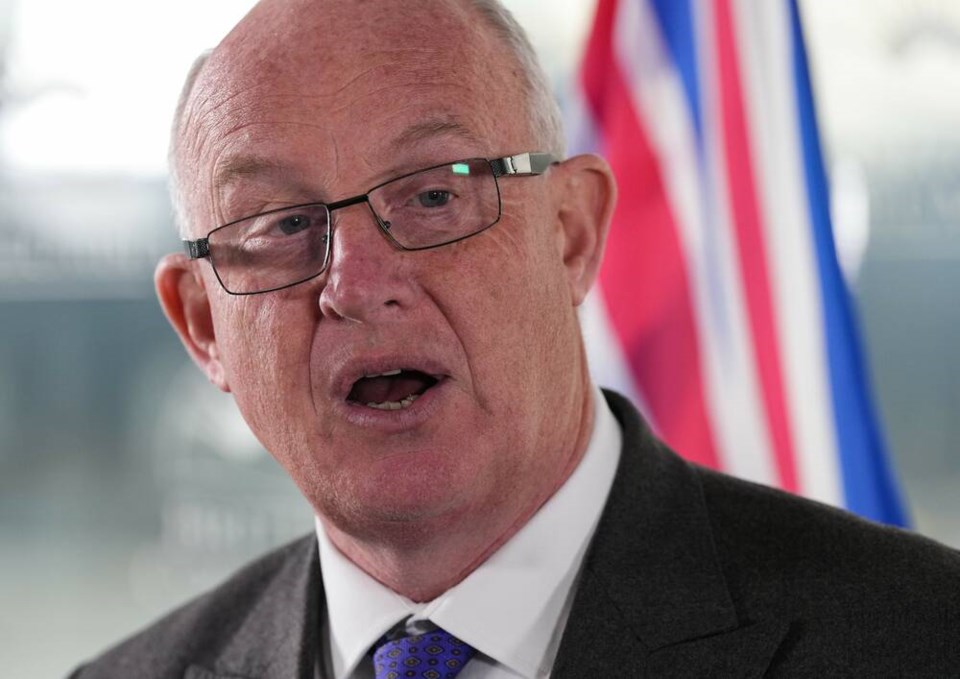The B.C. government should create therapeutic units that provide involuntary treatment for people with mental-health and addiction problems who are at high risk of harming others, says a report on prolific offenders and unprovoked attacks on strangers.
“The units would be for people who are not appropriate for forensic care but whose needs exceed the structural design and capacity of an open in-patient hospital unit,” says the report, released Wednesday. It was written by Doug LePard, a former Vancouver police deputy chief, and Amanda Butler, a health researcher and criminologist who specializes in mental health and substance-use disorders.
People can already be admitted to hospital under the Mental Health Act, but “low secure care units” would be designed specifically for those with extreme violent behaviours, such as the man who, in March, used a machete to attack another man in Beacon Hill Park.
The report says most health facilities in B.C. are not equipped or staffed to meet the needs of people who are violent.
“These units should be designed to provide intensive rehabilitation as well as social, housing, education, and employment services,” with strict accountability mechanisms to ensure compliance with the Mental Health Act and independent rights advice, says the report.
A secure care unit would “support those folks who maybe are being admitted to hospital and they require a higher threshold of security not just to protect the public but also to protect themselves,” said Butler, at a news conference in Vancouver with Public Safety Minister and Solicitor General Mike Farnworth and Attorney General Murray Rankin.
Farnworth said many of the report’s 28 recommendations focus on work already underway, but also highlight how much more the province has to do.
He said three recommendations the province will immediately act on are the return of the prolific offenders management pilot program scrapped in 2012, a dedicated provincial committee to co-ordinate service planning for people with complex health needs, and the B.C. First Nations Justice Council’s proposed pilot program based at the Prince George Indigenous Justice Centre to address recidivism amongst First Nations people.
In early May, the province launched an investigation into prolific criminals and the escalation of attacks on strangers, amid calls for action from business leaders and the Urban Mayors’ Caucus, a group of mayors from 13 cities.
In announcing the investigation in the spring, then Attorney General David Eby and Farnworth acknowledged community concerns about “unprovoked random attacks, violence, graffiti, shoplifting, or property damage” by a small group of prolific offenders.
“While overall crime rates have declined, communities have been dealing with challenges linked to repeat offending” by a small number of people “as well as unprovoked, often violent, stranger attacks,” which has a profound impact on victims and their feelings of safety in our province, Rankin said Wednesday.
Although Victoria’s non-violent Crime Severity Index (CSI) dropped by 20 per cent, its violent CSI increased by 21 per cent between 2020 and 2021.
The report does not recommend mandatory treatment for people who present with life-threatening substance use but are not a risk to other people.
It does recommend creation of segregated therapeutic units within provincial jails for people with mental health and substance-use disorders.
The report also recommends the B.C. Prosecution Service explore “therapeutic bail,” where the Crown and defence delay sentencing for people with mental-health and substance-use disorders while they undertake treatment to possibly avoid criminal conviction.
B.C. Liberal Leader Kevin Falcon, in an interview, said the recommendations take a “tiny, timid step” towards a “compassionate, yet importantly, involuntary treatment of folks who are suffering from severe mental-health issues, instead of warehousing them in motels and hotels along with those suffering from addictions, as the NDP is currently doing.”
Falcon has advocated for creation of a modern, more compassionate version of the old Riverview Hospital in Coquitlam, with psychiatric and medical supports to give people “the proper care and attention that they really deserve.”
Victoria Mayor Lisa Helps and Kelowna Mayor Colin Basran, co-chairs of the Urban Mayors’ Caucus, asked for action in December and wrote to Eby April 5, citing a Victoria offender who generated 248 police incidents and 55 charges in two years.
Helps, in an interview, said treatment for those with addiction and mental-health issues while in custody was a key recommendation. “I don’t know if we need to go around setting up a whole bunch of secure care facilities — maybe we do, maybe we don’t,” she said.
“But we’ve got prisons; we’re sending people to them. If people can have the opportunity to get health care, mental-health care, substance-use care while they’re already incarcerated, I think that’s probably the best integration of health and justice and probably the best bang for everybody’s buck.”
B.C. Green Leader Sonia Furstenau said in a statement that if the province wants to see less crime, it must take steps that include bolstering affordable housing, making treatment for mental-health and substance-use disorders accessible, ensuring a safe drug supply and addressing poverty and systemic racism. “This report also makes it clear that the increase in random violent attacks and crimes we are seeing is a direct result of allowing the toxic drug crisis to continue, and not treating mental health as part of our health-care system.”
• To read the executive summary and recommendations, go online to: news.gov.bc.ca/files/InvestigationRecommendations.pdf



